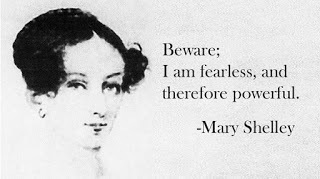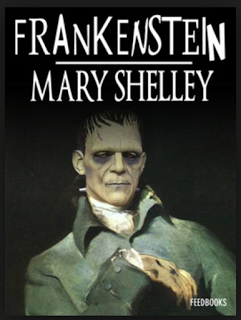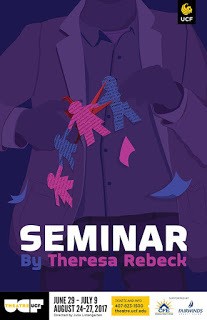Michael Gouker's Blog, page 11
August 30, 2017
It's Mary Shelley's 220th Birthday
Born in Somers Town, London, United Kingdom, in 1797, her story, Frankenstein, or The Modern Prometheus, lives on in a million minds. It is amazing how much it is quoted in film and fiction. It's a very effective archetype, the artificial/undead monster given life by an egotistical human seizing divine power. I recently saw a similar revisiting of the theme by Alex Garland in Ex Machina.

 "Life and death appeared to me ideal bounds, which I should first break through, and pour a torrent of light into our dark world."
"Life and death appeared to me ideal bounds, which I should first break through, and pour a torrent of light into our dark world."

 "Life and death appeared to me ideal bounds, which I should first break through, and pour a torrent of light into our dark world."
"Life and death appeared to me ideal bounds, which I should first break through, and pour a torrent of light into our dark world."
Published on August 30, 2017 12:02
August 28, 2017
Hugo Awards: Women > Sad Puppies
After several years of political influence that resulted in No Award votes for the Hugo Awards, this year's were largely uncontroversial, but the results were surprising to many who are not paying attention to SFF. A picture is better to convey the information:
 Also, N.K. Jemisin who just finished The Broken Earth trilogy. Her series won the Hugo Award last year and this year. Her release this year has a great chance too: n-k-jemisin-broken-earth-trilogy-the-stone-sky-fantasy-book-review
Also, N.K. Jemisin who just finished The Broken Earth trilogy. Her series won the Hugo Award last year and this year. Her release this year has a great chance too: n-k-jemisin-broken-earth-trilogy-the-stone-sky-fantasy-book-review
 Also, N.K. Jemisin who just finished The Broken Earth trilogy. Her series won the Hugo Award last year and this year. Her release this year has a great chance too: n-k-jemisin-broken-earth-trilogy-the-stone-sky-fantasy-book-review
Also, N.K. Jemisin who just finished The Broken Earth trilogy. Her series won the Hugo Award last year and this year. Her release this year has a great chance too: n-k-jemisin-broken-earth-trilogy-the-stone-sky-fantasy-book-review
Published on August 28, 2017 07:31
August 25, 2017
Cinder, a hero story in the future from the past, by Marissa Meyer (4 star recommendation)
 Cinder by Marissa Meyer
Cinder by Marissa MeyerMy rating: 4 of 5 stars
Marissa Meyer writes fairy tales in a dystopian future of high technology and little hope. Cinder, the protagonist, is a homologue of Cinderella. We have a Prince, an evil stepmother, and other aspects of the famous tale, but the original story is used as a device to articulate a much larger narrative, a story of terrifying danger, not only for the protagonist but all of humanity.
I really like what the author has done, especially the technical aspects that are at once ultramodern and, yet, full of the same quirks as our world that keep the maintenance people in business--a good thing since our protagonist is a mechanic.
The world-building is intriguing, but what I most enjoyed was the sarcastic wit of the protagonist. All of this helps build a likable character, and it works very well. It's even more than the story. The book challenges assumptions about race and a woman's role in a fantasy setting. Our protagonist is a heroic figure who uses her brain to vanquish disaster. It's easy to cheer for Cinder.
View all my reviews
Published on August 25, 2017 15:04
August 19, 2017
Wild Cards - Edited by George R. R. Martin
 Wild Cards by George R.R. Martin
Wild Cards by George R.R. MartinMy rating: 3 of 5 stars
A mosaic novel where after an alien virus is exploded over New York City (and into the jet stream), society has a parallel force of Aces and Jokers, victims/beneficiaries of the virus. What's coolest (for me) is the way actual events were woven into the story: the McCarthy HUAD hearings, the protest against Viet Nam, Watergate... All in all, it's pretty cool.
The stories, however, are uneven:
1. Prologue: a solid piece that explains how Tachyon arrives on Earth.
2. Thirty Minutes Over Broadway! (Waldrop): Even though the story is dark, it taps into the heroic genre. Jetboy is a larger-than-life hero worshipped by the people. The maniac dispersing a virus over New York City rings a lot different now (post 9/11) than when it was written. Consequently, I was really pulling for Jetboy’s success, though, of course, that would have made for a short series. ;-)
3. The Sleeper (Roger Zelazny): One of my favorites in the collection. It really helps demonstrate the wide range of outcomes. Croyd Crenson is a great gray character, living in an uncertain world with complicated morals.
4. Witness (Walter Jon Williams): Introduces a hero turned villain, Jack Braun, along with the HUAC’s involvement in the story. This was depressing and effective.
5. Degradation Rites: (Melinda Snodgrass) So this is the HUAC case from another angle, from the perspective of Tachyon and Blythe. Since she is my favorite of the Aces and I have absolute contempt for the HUAC, I found the story to be compelling and was left distraught. Effective tale.
6. Shell Games (GRRM): The Great and Powerful Turtle details the rise of a new era of aces. Clever story and the characters were true to form, powerful and foolhardy as juveniles with Peter Parker-like popularity.
7. Dark Night of Fortunato (Lewis Shiner): The hero of this story is a pimp who acquires telepathic powers (or perhaps read telepathic impressions) when he has an orgasm, sucking in the tantric energy of whoever he is with, like a Reichian vampire. He uses this power to find a serial killer, someone who has killed one of his working geishas. When I started reading this, I was excited by the darkness, the violence, and the sex, but the backstory—where we learn how Fortunato became a pimp (at 14)—and his scene with Lenore felt so cliché. I had that moment where you look at the book in your hand and question your judgment. It felt a bit tawdry.
8. Transfigurations: (Victor Milán) Introduces Cap’n Trips. Best story of the book, imho. Mark’s an MIT student trying to break into 1960s West Coast culture, about to do his thesis on psychotropic drugs, but hasn’t really indulged. He runs into a girl he knew from high school who is well-versed in such matters, revisits his adolescent lust for her, and ends up at an anti-war rally tripping balls. What happens next is pretty much amazing.
9. Wild Card Chic: (Tom Wolfe) I love this placement. We see the WC folks are in vogue now. They have their special restaurant and everything’s going right… finally. Even Dr. Tachyon is happy.
10. Down Deep: (Edward Bryant & Leanne Harper) Bagabond, the bag lady, Sewer Jack, alligator man, and CC Ryder (the train). This was pretty weak. The crime angle seemed very cliché. So many stereotypes.
11. Strings (Steven Leigh): The Puppetman manipulates everyone to get everything he wants. People fall for it. I like this villain. The story made me wonder what the limits of psychic power are. Puppetman can control so many people at once. I guess with all the trickery my suspension of disbelief was affected.
12. Comes a Hunter (John J. Miller): This is about how Yeoman seeks revenge. The battle scene was clever. Not bad, but not at the level of some of the earlier stories.
13. Epilogue (Lewis Shiner): Yeah, also didn’t move the needle for me.
View all my reviews
Published on August 19, 2017 14:28
August 15, 2017
Vernal Falls
One of the first places Denise and I went together was Vernal Falls in Yosemite. At the end of the trail is a climb to the top of the 318-foot waterfall. It takes almost as long to climb to the top of the fall as it does to reach the start of the switchbacks. I'm not sure how far we went before turning back. The rocks were slick, and we weren't in great shape, smoking, etc. I remember the amazing view, though. It was something like this:
 I'm posting a contour map too. You can see how the two trails diverge. The trail climbs more steeply when the contour lines are closer:
I'm posting a contour map too. You can see how the two trails diverge. The trail climbs more steeply when the contour lines are closer:

 I'm posting a contour map too. You can see how the two trails diverge. The trail climbs more steeply when the contour lines are closer:
I'm posting a contour map too. You can see how the two trails diverge. The trail climbs more steeply when the contour lines are closer:

Published on August 15, 2017 16:25
August 9, 2017
Getting Ready for the Solar Eclipse

So, with the solar eclipse arriving on 8/21/2017, the first thing you should remember is never to look directly at The Sun, even during the eclipse. There are commercial solar glasses available, but before you buy, make sure the lenses you purchase are really certified. There is an onslaught of counterfeit vendors of solar glasses now.https://eclipse.aas.org/resources/sol...
Also, note that looking at The Sun through a film (developed or undeveloped), polarized glass, or (even the best) sunglasses is NOT SAFE. Even if some light is blocked, there is a full electromagnetic spectrum that your retinae are exposed too.
There is, however, an excellent (and cheap) way of observing the passage of The Moon across The Sun. The simplest version requires two pieces of paper or cardboard:
How to make an inexpensive projector to safely watch the progress of the eclipse.Also, you want to be mobile in case the weather changes. Be flexible with your plans. Get wherever you are going early and be ready to move if necessary.NASA is having cross-country events where they will have 1,500,000 solar viewers available. Here is a link to find an official viewing site nearby:
Click for Official NASA Viewing Locations
http://xjubier.free.fr/en/site_pages/solar_eclipses/TSE_2017_GoogleMapFull.html
Published on August 09, 2017 18:52
July 31, 2017
Happy Birthday, Jerry!
Published on July 31, 2017 23:10
July 28, 2017
Distribution of Metal Bands in Europe
Ok, let's imagine that there are 4 band members in each band. That means about 2500 people per million in Finland. In other words, one in every 400 people of Finland, including babies, is in a metal band. Hey, Sweden is pretty kick ass too.
\m/

\m/

Published on July 28, 2017 21:39
July 17, 2017
The Grind Show by Phil Tucker
 The Grind Show by Phil Tucker
The Grind Show by Phil TuckerMy rating: 3 of 5 stars
The Grind Show is an early novel by Phil Tucker that explores a world where demons cohabit with humans. Only a few human beings can perceive them, both through sight and esp. For other humans, these demon fighters are insane. Our protagonist is one of the demon hunters who gets a special unwanted gift from one of the "unclean ones," setting off a course of events that places him opposed to a bad ass mf demon controller.
Positives:
It's a long sequence of action from the beginning of the story until the end, which works here because it's a span of three days of high-speed insanity. The use of fragments, especially in the action, reinforces this mood. The fast pace is compelling and makes for an easy one-sitting read.
There is also more going on than what is happening at the surface but the story ends without revealing much about the world. We don't know why there were angels or why they left or what any of this means in a philosophical context. Tucker's demons are just evil creatures without many purposes or are they? Is there something deeper going on? Jason, the protagonist, isn't wired to think about philosophy. He is a man of action and few doubts, guided by reckless humor, and unworried about consequences except how it affects his friends.
The best part of the story, indeed, is how Jason, through Twain, Javier, Jeremy, and the others, expresses his loyalty. Earlier in the story, I thought him 2-dimensional and superficial, but Jason grew, rising to the challenge, responding to his errors by evolving. This worked well for me.
Negatives:
This book really needed a careful edit. I looked for an updated edition on Kindle without success, so I'm guessing there are still plenty of errors in the text. Being self-published is no excuse for being sloppy, especially when you can ask people to beta read it for you. There are homonym confusions, grammatical syntax errors, and redundant word choices that can be eliminated even with online tools without much effort. This should have been done.
As for the story itself, for what it aspires as a light demon hunt romp, I have no objections at all. The action is a bit like a Michael Bay film with shotguns going off all the time. The story fulfills the need for violence and action like a glove.
For the characters, I felt there was a bit of a cookie-cutterness to them, but this is a demon hunt, not literary fiction. Jason is often puerile and Twain a bit too lackadaisical about losing, well, everything. Also, this Father Martin is paper thin. What are we really talking about here? What is this language of angels?
I get the feeling that there is more to the story than what is shown.
Still, all in all, it was fun to read.
View all my reviews
Published on July 17, 2017 09:12
July 9, 2017
UCF Production of Seminar
Seminar, a UCF Theater production

I enjoyed the performance of Theresa Rebeck’s Seminar, a story about four aspiring novelists who sign up for a weekly writing seminar with a well-known literary figure, Leonard (played by Earl Weaver.) The four authors are Kate, Izzy, Douglas, and Martin. Kate, a feminist who reads Kerouac in the tub, but lambasts his work, is played by Alexandra Pica. Eranthis Rose Quigley plays Izzy, the nymphomaniac whose praised work is discredited by the others because of her affinity for blurring the teacher-student relationship with sexual grease. Martin, who so fears rejection that he doesn’t present anything until the end of the story and then rejects Leonard’s praise, is played by Logan Ayala. Finally, Sebastian Gonzalez plays Douglas, the only writer that has any semblance of success. Although I was most impressed by Mr. Weaver (especially the soliloquy in response to Martin’s attack), all the actors did a tremendous job.
So, to appreciate this story, you must understand how hard it is for writers to feel confident in their work. We lay out our hearts on the page, hoping that it will make some difference, some emotional connection to someone, anyone, and watch as their hope wilts into despair. If you do it right, your story is written in blood and tears, your soul left raw, and you never get callouses. I remember a story that Stephen King tells about how he gave a manuscript for his novelist wife Tabitha to read while they were on a trip, how he watched for her reaction to his humor and how his anticipation made her ask him, “Why are you so damn needful?” It’s a deep vein. So, Seminar focuses on this vulnerability and hits some canny points, though it exaggerates and is a bit clumsy, sometimes sewing whole cloth with railroad spikes. Douglas’s rant about exteriority and interiority and so forth is a funny lampooning of literary criticism, but in truth, such analysis is essential in organizing our discourse for investigation of our art, a discourse essential for discerning deeper meaning (if that is our goal.)
On the other hand, is there any writer who doesn’t tremble when a reader they respect reads the first sentence of their work worrying that it isn’t up to snuff? How long does that take? LOL. When Kate says, “That’s not even the whole sentence!” after Leonard can’t get past her semi-colon, her frustration is the echo of thousands. But then later Leonard says, “If you’re defending yourself, you’re not listening,” and dammit that’s true too. I think I mostly identified with Kate in the story, but a younger version of me that cared even more about acceptance. When she says, “If I want somebody to tell me I’m wasting my time, I can just call my mother,” I felt so bad for her, but authors want truth more than anything else. Truth is the commodity that is most useful.
I guess this is a good time to say that Alexandra Pica became Kate; it was a brilliant performance. Kate’s part is complicated: The fact that Leonard’s criticism of Kate’s 6-year-old short story forces her to another topic reveals a growth path to her career is insightful. Leonard criticizes her work as something so overworked that it has lost its soul is a common fear I have, especially about my old stories. We always want to make the work better, but sometimes you can never duplicate that white hot tongs in the inferno effort that brought you to the story in the first place. Sometimes maybe we can rewrite it into a “desiccated corpse.” That really hit me. Still, not all of it was harrowing, Kate’s argument that Leonard attacked her work from a male chauvinist perspective was on target, but I cannot imagine how Jane Austen’s work can be held up as a feminist expression either, except in tongue-in-cheek humor.
Martin, the character that is paired with everyone, passes through the social experiment unruffled except for financial woes partially caused by the cost of the seminar. Mr. Ayala brings power into the liquid role, well positioned against the other men and rotating between the women for sex (Izzy) and lodging (Kate.) It’s Machiavellian and clever.
His relationship with Leonard is frightful because Martin fears rejection and Leonard is rejection incarnate. Martin has a couple thousand pages of work that he is afraid to present (“a regular Emily Dickinson without the charm” is Leonard’s gruff retort.) To be frank, I had some trouble correlating his role with his actions, because his outward personality is not self-reflective like I would expect it to be if he felt so vulnerable. Instead, Martin attacks Douglas’s literary chops and fortunate son status, enjoys a love affair with Izzy, and takes Kate for granted, assuming she is as needful as he. When he has his best chance to be a good friend (when Kate destroys their illusion of Leonard by inventing her Cubano transvestite gang-member who offers to take her place in the group, ironically proving Leonard right while she tries to dismiss him) instead of being supportive, Martin condemns Kate too. Odd.
Feminism is a common topic, especially between Kate and Izzy (who paint it differently) and Kate and Leonard, who are opposite poles. The men in the play, incidentally, are male chauvinists, while the women are too happy to assume traditional sexual roles for gain. The only queer reference in the story was when Leonard tells Martin that he doesn’t need to worry about being sexually dominated because he isn’t his type.
I have to say that I was distracted by the excessive cursing, not because I think it is foul—I don’t—but because it loses its effectiveness (to me at any rate) in excess. Language, being a key topic of the story, I thought it odd that the most dramatic words faded into the background, their power sucked away by their distressing frequency.
Now I want to discuss Izzy and sex. One second while I compose myself. That's better. ;-)
Her part demonstrates how sex both opens doors to success and makes any such achievement questionable. Izzy illustrates a fundamental truth: Professional women—even in modern times—cannot express their sexual selves with power and still expect to be respected in their profession. Men can. We’re expected to, but women must foreswear their sexual selves and beautiful women have it the worst. Izzy, who radiates seductive enticement, gives a casual twist of that knife of truth. And there’s the rub. You see, Izzy's sex appeal doesn't reduce her. She is its master and this freedom gained allows her to achieve her objectives. In fact, if we subtract the assumption that her work is without merit (why should we presume the other writers are right? Because of society's preconceived notions?), then perhaps Leonard is being sincere in his praise of her talent with the Shanghai story.
Izzy is the group's glue. She tells Martin, “Stop making a big deal about language,” meaning for him to stop using it as a wedge against Douglas. She pleads with them all to cooperate, that they’re all in it together. Plus, her instincts are right about Martin’s feelings for Kate (revealed later when she rejects him.)
She is no fool, nor does she have time for illusions. Her biological clock is ticking and her intention is to succeed. She is the most feral of Leonard’s cats. When she states that her goal is to write drug menace books and pose for the cover with her shirt off—this said as she dances topless around the sofa—she is undiminished. Rather she emotes territorial presence, feline prowess, and sets a consistent tone for the rest of her story, where sex is a game of low consequence where she always wins. When the confident Izzy says, “I just hate all those women who are hung up about sex,” it divides her from Kate, a good Samaritan who longs for deeper expression than physical intimacy, someone who exudes discomfort. Izzy is played by Eranthis Rose Quigley (her site - GREAT job on your site, Mademoiselle who can run in heels and do headstands) who brought the right amount of daring and self-awareness to her part. Bravo!
And that brings us to Douglas, the anointed one, whose uncle is famous and has a lever over Leonard, because of a past accusation of plagiarism. His submission to the New Yorker is given to Leonard and he waits for praise but instead is called a whore. Let’s get this right: “Capable, graceful in places, a detached tone of perplexed intelligence, you have a relatively famous last name, in literary circles, not too famous but famous enough. It’s not a home run but it’s a standing double.” Ouch.
Then Leonard advises for him to write for Hollywood, because “you’re talented, like I said, but you’re never going to be great. And there are a lot of people who are never going to be great, most fiction writers just evaporate, really, but that’s going to be a problem for you because of your kind of whorish attitude to the whole thing, the name dropping, and of course the name.” Most fiction writers just evaporate. Ouch. Ouch. Whimpering sound.
Gonzalez plays his role to perfection, crafting the image of the lucky guy whose success you might resent, but whose talent you must admit. When his fate is illustrated by Leonard, though, your heart is stone if you don’t feel pity for him. And he still looks whorish. I loved his performance. Fantastic.
The tour-de-force performance, though, belongs Weaver, who slew. His Leonard articulated the wall of rejection that author's face and he made it all too human. When his students object, he replies (I think to Kate, but maybe Martin), “The fucking critics will say worse. To all of you. If it gets in. If it gets in, at all, you’re doomed.” Sigh. And then in his own story, where he responds to the perjury charges, he tells his story of literary success. At one point, around the second or third novel, he says, “You’ll feel like you’re in the 9th Circle of Hell, where the betrayers of Christ are frozen in eternal cannibalistic silence, only it’s not flesh you’ll be consuming, it’s your mind.”
And maybe then it's important to reflect on the quality of the class:
Student 1: Kate. Moves on from a story vacuum sucking away her life. Now moving forward in her career.
Student 2: Izzy. Gets to meet Salman Rushdie, one of my favorite authors.
Student 3: Doug. Gets a meeting with the Weinstein brothers who run studios like Miramax.
Student 4: Martin. Decides to work with him and fuck him up like Mephistopheles in his pocket.
A good deal overall, in my opinion, though getting there was probably painful.
Anyway, the miracle of Rebeck’s story is that all of this horror becomes pretty damn funny. Great direction, lighting, and audio too.
p.p1 {margin: 0.0px 0.0px 0.0px 0.0px; line-height: 15.0px; font: 12.6px Arial; color: #262626; -webkit-text-stroke: #262626} p.p2 {margin: 0.0px 0.0px 0.0px 0.0px; line-height: 15.0px; font: 12.6px Arial; color: #262626; -webkit-text-stroke: #262626; min-height: 14.0px} span.s1 {font-kerning: none}
You made me proud, Knights! Charge on!

I enjoyed the performance of Theresa Rebeck’s Seminar, a story about four aspiring novelists who sign up for a weekly writing seminar with a well-known literary figure, Leonard (played by Earl Weaver.) The four authors are Kate, Izzy, Douglas, and Martin. Kate, a feminist who reads Kerouac in the tub, but lambasts his work, is played by Alexandra Pica. Eranthis Rose Quigley plays Izzy, the nymphomaniac whose praised work is discredited by the others because of her affinity for blurring the teacher-student relationship with sexual grease. Martin, who so fears rejection that he doesn’t present anything until the end of the story and then rejects Leonard’s praise, is played by Logan Ayala. Finally, Sebastian Gonzalez plays Douglas, the only writer that has any semblance of success. Although I was most impressed by Mr. Weaver (especially the soliloquy in response to Martin’s attack), all the actors did a tremendous job.
So, to appreciate this story, you must understand how hard it is for writers to feel confident in their work. We lay out our hearts on the page, hoping that it will make some difference, some emotional connection to someone, anyone, and watch as their hope wilts into despair. If you do it right, your story is written in blood and tears, your soul left raw, and you never get callouses. I remember a story that Stephen King tells about how he gave a manuscript for his novelist wife Tabitha to read while they were on a trip, how he watched for her reaction to his humor and how his anticipation made her ask him, “Why are you so damn needful?” It’s a deep vein. So, Seminar focuses on this vulnerability and hits some canny points, though it exaggerates and is a bit clumsy, sometimes sewing whole cloth with railroad spikes. Douglas’s rant about exteriority and interiority and so forth is a funny lampooning of literary criticism, but in truth, such analysis is essential in organizing our discourse for investigation of our art, a discourse essential for discerning deeper meaning (if that is our goal.)
On the other hand, is there any writer who doesn’t tremble when a reader they respect reads the first sentence of their work worrying that it isn’t up to snuff? How long does that take? LOL. When Kate says, “That’s not even the whole sentence!” after Leonard can’t get past her semi-colon, her frustration is the echo of thousands. But then later Leonard says, “If you’re defending yourself, you’re not listening,” and dammit that’s true too. I think I mostly identified with Kate in the story, but a younger version of me that cared even more about acceptance. When she says, “If I want somebody to tell me I’m wasting my time, I can just call my mother,” I felt so bad for her, but authors want truth more than anything else. Truth is the commodity that is most useful.
I guess this is a good time to say that Alexandra Pica became Kate; it was a brilliant performance. Kate’s part is complicated: The fact that Leonard’s criticism of Kate’s 6-year-old short story forces her to another topic reveals a growth path to her career is insightful. Leonard criticizes her work as something so overworked that it has lost its soul is a common fear I have, especially about my old stories. We always want to make the work better, but sometimes you can never duplicate that white hot tongs in the inferno effort that brought you to the story in the first place. Sometimes maybe we can rewrite it into a “desiccated corpse.” That really hit me. Still, not all of it was harrowing, Kate’s argument that Leonard attacked her work from a male chauvinist perspective was on target, but I cannot imagine how Jane Austen’s work can be held up as a feminist expression either, except in tongue-in-cheek humor.
Martin, the character that is paired with everyone, passes through the social experiment unruffled except for financial woes partially caused by the cost of the seminar. Mr. Ayala brings power into the liquid role, well positioned against the other men and rotating between the women for sex (Izzy) and lodging (Kate.) It’s Machiavellian and clever.
His relationship with Leonard is frightful because Martin fears rejection and Leonard is rejection incarnate. Martin has a couple thousand pages of work that he is afraid to present (“a regular Emily Dickinson without the charm” is Leonard’s gruff retort.) To be frank, I had some trouble correlating his role with his actions, because his outward personality is not self-reflective like I would expect it to be if he felt so vulnerable. Instead, Martin attacks Douglas’s literary chops and fortunate son status, enjoys a love affair with Izzy, and takes Kate for granted, assuming she is as needful as he. When he has his best chance to be a good friend (when Kate destroys their illusion of Leonard by inventing her Cubano transvestite gang-member who offers to take her place in the group, ironically proving Leonard right while she tries to dismiss him) instead of being supportive, Martin condemns Kate too. Odd.
Feminism is a common topic, especially between Kate and Izzy (who paint it differently) and Kate and Leonard, who are opposite poles. The men in the play, incidentally, are male chauvinists, while the women are too happy to assume traditional sexual roles for gain. The only queer reference in the story was when Leonard tells Martin that he doesn’t need to worry about being sexually dominated because he isn’t his type.
I have to say that I was distracted by the excessive cursing, not because I think it is foul—I don’t—but because it loses its effectiveness (to me at any rate) in excess. Language, being a key topic of the story, I thought it odd that the most dramatic words faded into the background, their power sucked away by their distressing frequency.
Now I want to discuss Izzy and sex. One second while I compose myself. That's better. ;-)
Her part demonstrates how sex both opens doors to success and makes any such achievement questionable. Izzy illustrates a fundamental truth: Professional women—even in modern times—cannot express their sexual selves with power and still expect to be respected in their profession. Men can. We’re expected to, but women must foreswear their sexual selves and beautiful women have it the worst. Izzy, who radiates seductive enticement, gives a casual twist of that knife of truth. And there’s the rub. You see, Izzy's sex appeal doesn't reduce her. She is its master and this freedom gained allows her to achieve her objectives. In fact, if we subtract the assumption that her work is without merit (why should we presume the other writers are right? Because of society's preconceived notions?), then perhaps Leonard is being sincere in his praise of her talent with the Shanghai story.
Izzy is the group's glue. She tells Martin, “Stop making a big deal about language,” meaning for him to stop using it as a wedge against Douglas. She pleads with them all to cooperate, that they’re all in it together. Plus, her instincts are right about Martin’s feelings for Kate (revealed later when she rejects him.)
She is no fool, nor does she have time for illusions. Her biological clock is ticking and her intention is to succeed. She is the most feral of Leonard’s cats. When she states that her goal is to write drug menace books and pose for the cover with her shirt off—this said as she dances topless around the sofa—she is undiminished. Rather she emotes territorial presence, feline prowess, and sets a consistent tone for the rest of her story, where sex is a game of low consequence where she always wins. When the confident Izzy says, “I just hate all those women who are hung up about sex,” it divides her from Kate, a good Samaritan who longs for deeper expression than physical intimacy, someone who exudes discomfort. Izzy is played by Eranthis Rose Quigley (her site - GREAT job on your site, Mademoiselle who can run in heels and do headstands) who brought the right amount of daring and self-awareness to her part. Bravo!
And that brings us to Douglas, the anointed one, whose uncle is famous and has a lever over Leonard, because of a past accusation of plagiarism. His submission to the New Yorker is given to Leonard and he waits for praise but instead is called a whore. Let’s get this right: “Capable, graceful in places, a detached tone of perplexed intelligence, you have a relatively famous last name, in literary circles, not too famous but famous enough. It’s not a home run but it’s a standing double.” Ouch.
Then Leonard advises for him to write for Hollywood, because “you’re talented, like I said, but you’re never going to be great. And there are a lot of people who are never going to be great, most fiction writers just evaporate, really, but that’s going to be a problem for you because of your kind of whorish attitude to the whole thing, the name dropping, and of course the name.” Most fiction writers just evaporate. Ouch. Ouch. Whimpering sound.
Gonzalez plays his role to perfection, crafting the image of the lucky guy whose success you might resent, but whose talent you must admit. When his fate is illustrated by Leonard, though, your heart is stone if you don’t feel pity for him. And he still looks whorish. I loved his performance. Fantastic.
The tour-de-force performance, though, belongs Weaver, who slew. His Leonard articulated the wall of rejection that author's face and he made it all too human. When his students object, he replies (I think to Kate, but maybe Martin), “The fucking critics will say worse. To all of you. If it gets in. If it gets in, at all, you’re doomed.” Sigh. And then in his own story, where he responds to the perjury charges, he tells his story of literary success. At one point, around the second or third novel, he says, “You’ll feel like you’re in the 9th Circle of Hell, where the betrayers of Christ are frozen in eternal cannibalistic silence, only it’s not flesh you’ll be consuming, it’s your mind.”
And maybe then it's important to reflect on the quality of the class:
Student 1: Kate. Moves on from a story vacuum sucking away her life. Now moving forward in her career.
Student 2: Izzy. Gets to meet Salman Rushdie, one of my favorite authors.
Student 3: Doug. Gets a meeting with the Weinstein brothers who run studios like Miramax.
Student 4: Martin. Decides to work with him and fuck him up like Mephistopheles in his pocket.
A good deal overall, in my opinion, though getting there was probably painful.
Anyway, the miracle of Rebeck’s story is that all of this horror becomes pretty damn funny. Great direction, lighting, and audio too.
p.p1 {margin: 0.0px 0.0px 0.0px 0.0px; line-height: 15.0px; font: 12.6px Arial; color: #262626; -webkit-text-stroke: #262626} p.p2 {margin: 0.0px 0.0px 0.0px 0.0px; line-height: 15.0px; font: 12.6px Arial; color: #262626; -webkit-text-stroke: #262626; min-height: 14.0px} span.s1 {font-kerning: none}
You made me proud, Knights! Charge on!
Published on July 09, 2017 18:36




